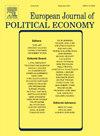Online social media and populism in Europe
IF 2.4
3区 经济学
Q2 ECONOMICS
引用次数: 0
Abstract
We investigate the impact of social media (e.g., Facebook, Instagram, Twitter, and LinkedIn) on left-wing and right-wing populist voting patterns within the European Union 27 (EU-27). Our empirical analysis is based on an Ordered Probit model, over 2014–2020. We differentiate between politically oriented communication and general communication, through social media. We find that politically oriented communication on platforms like Facebook and LinkedIn contributes to the electoral success of right-wing parties. In contrast, active engagement of left-wing parties on social media platforms, such as Facebook, Twitter, and LinkedIn appears not to enhance their electoral success. This suggests that right-wing parties effectively leverage platforms like Facebook and LinkedIn to disseminate populist ideologies, while left-wing parties face challenges with their engagement strategies on these platforms.
欧洲的网络社交媒体和民粹主义
我们研究了社交媒体(如Facebook、Instagram、Twitter和LinkedIn)对欧盟27国(EU-27)左翼和右翼民粹主义投票模式的影响。我们的实证分析基于有序概率模型,时间跨度为2014-2020年。我们区分了政治导向的沟通和通过社交媒体进行的一般沟通。我们发现,Facebook和LinkedIn等平台上以政治为导向的交流有助于右翼政党的选举成功。相比之下,左翼政党在Facebook、Twitter和LinkedIn等社交媒体平台上的积极参与似乎并没有提高他们的选举成功率。这表明右翼政党有效地利用Facebook和LinkedIn等平台传播民粹主义意识形态,而左翼政党在这些平台上的参与策略则面临挑战。
本文章由计算机程序翻译,如有差异,请以英文原文为准。
求助全文
约1分钟内获得全文
求助全文
来源期刊

European Journal of Political Economy
Multiple-
CiteScore
3.40
自引率
10.00%
发文量
106
期刊介绍:
The aim of the European Journal of Political Economy is to disseminate original theoretical and empirical research on economic phenomena within a scope that encompasses collective decision making, political behavior, and the role of institutions. Contributions are invited from the international community of researchers. Manuscripts must be published in English. Starting 2008, the European Journal of Political Economy is indexed in the Social Sciences Citation Index published by Thomson Scientific (formerly ISI).
 求助内容:
求助内容: 应助结果提醒方式:
应助结果提醒方式:


